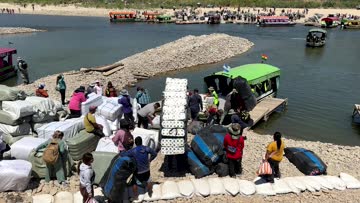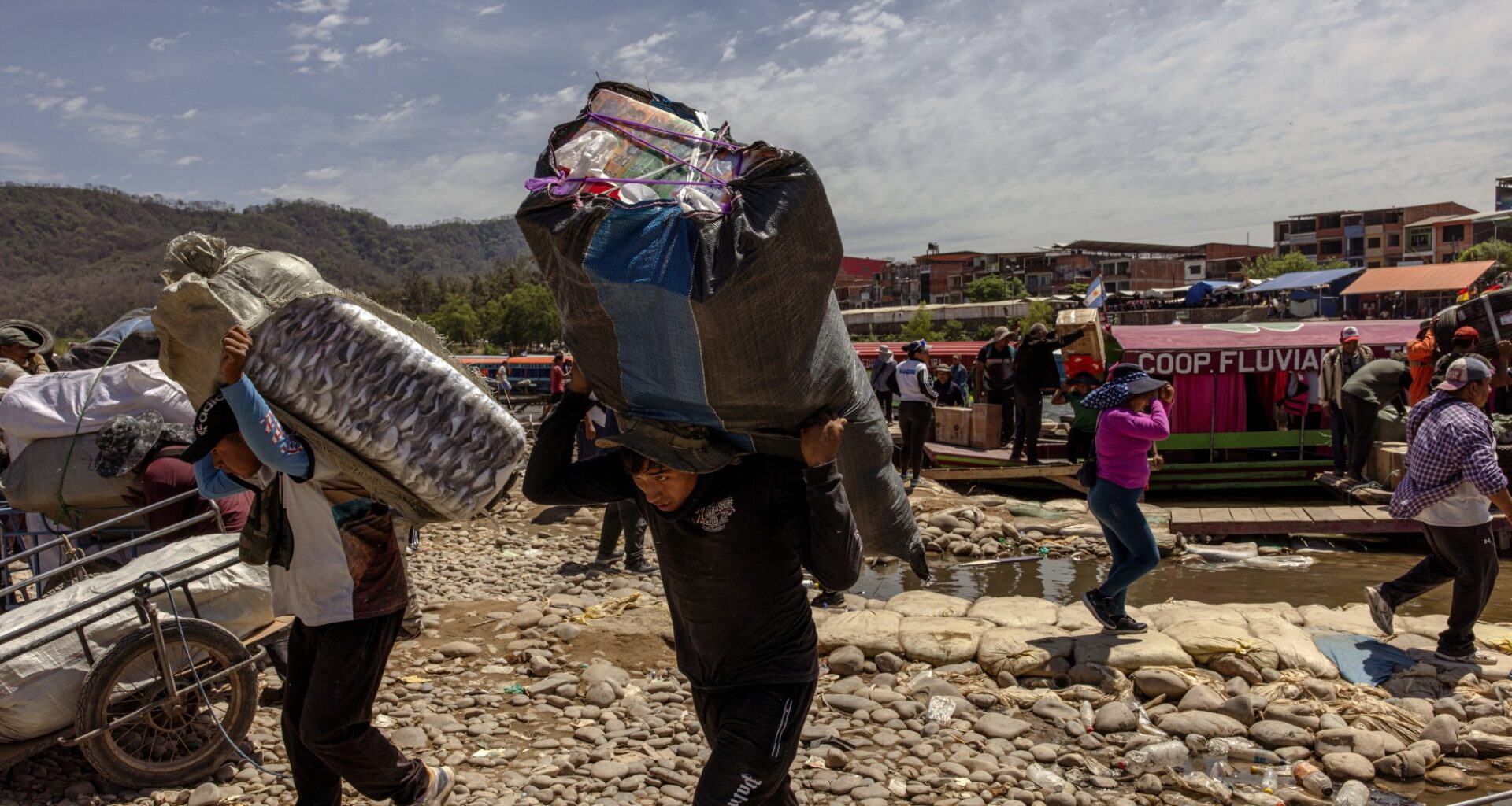Argentina’s president has made shoring up his currency a priority, but a flood of cheap contraband imports is hurting businesses and raising fears of a rout at the polls.
By Patrick Gillespie
Photography & video by Sarah Pabst for Bloomberg
October 21, 2025 at 9:00 AM EDT
Workers at the Argentine border haul sacks of goods from Bolivia.
Two years after voters in Salta overwhelmingly supported Javier Milei to become president of Argentina, a flailing economy dominated by black-market trade may be undermining his political support just when he needs it the most.
Salta, a picturesque, boot-shaped province in Argentina’s northwest, boasts vast reserves of lithium, copper, silver and gold. Vineyards in the Cafayate region, set against the Andes, are producing award-winning Malbecs and other sought-after varieties.
Milei first kept an iron grip on the peso with currency controls he inherited – and now routinely spends money to prop it up in local markets. As a result, “Salta the Beautiful” has seen a surge of untaxed and counterfeit imports from iPhones and tablets to washing machines and toilet paper flowing across the border from Bolivia and on to buyers in Buenos Aires and other cities across the country.
Salta “has long been a gateway for everything – drug trafficking, human trafficking, contraband,” said Mauricio Loutaif, a third-generation store owner in the border city of Oran. “Contraband always existed around here, but in the last couple of years there’s been an unprecedented amount.”

In Bermejo, Bolivia, workers load boats with goods bound for Argentina, part of a steady flow of unofficial commerce spurred by high prices across the border.
Every day at sunrise, workers in Salta’s lowland tropics confront punishing heat, ruthless mosquitoes and venomous snakes to take part in the chaotic border trade. Burnt molasses from sugar refineries and forest-fire smog sting the air as young men and women rush along narrow paths to sandy, trash-strewn river banks, where barges wait to ferry them to jobs that keep the low-priced merchandise flowing.
The boom is largely the result of Milei’s efforts to keep tight control over the value of the peso while Bolivia’s economic woes cause its currency to crater, creating a massive discount for consumers just across the river.
Strong Argentine Peso Spurs Border Trade
Source: Bloomberg reporting
The effects of Milei’s policies haven’t been limited to informal trade in backwater border towns. Argentines flush with overvalued pesos are also packing malls in Chile, beaches in Rio de Janeiro and traveling to Miami and New York. The US Treasury Department stepped in to assist Milei this month, buying pesos and agreeing to $20 billion lifeline as part of a larger package to help keep the currency steady.
Despite the stability the US has provided, Milei is in political danger. His coalition was trounced in local legislative elections in Buenos Aires in September, and his frustrated supporters fear a similar result in pivotal midterm elections set for Oct. 26.
Milei Ended Kirchners’ Grip on Salta
The former president and candidates she supported consistently won Salta in presidential elections until Milei arrived
Note: 2015 and 2023 were runoff votes Source: Camara Nacional Electoral
For Milei’s candidates, the consequences could be severe. President Donald Trump said last week at the White House that the assistance that Washington has given the country is contingent on Milei remaining in control.
“If he doesn’t win,” Trump said, “we’re gone.”
Salta is one of several interior provinces where Milei’s governing coalition needs to make up the ground lost in Buenos Aires. In the country’s most populous state, voters disillusioned by Milei’s austerity campaign stayed home, leading to the province’s lowest turnout for legislative elections in decades. Young voters who’d supported Milei two years ago didn’t show up in force this time.
Read More: Jamie Dimon Heads to Argentina Before Key Test for Milei
In Oran more than three dozen shops have closed this year because of competition from cheaper, illicit imports from Bolivia, and some surviving stores say their sales have fallen by nearly half.
Local employers are having a difficult time hanging on to workers who are giving up the security of a salary and benefits to perform back-breaking labor that can pay four times as much. Over the past decade, approximately a million more workers in Argentina have flowed into so-called informal jobs outside the economic mainstream, according to government data.
In Oran, shopkeepers are closing their doors as low-cost goods from across the border flood the town through informal trade channels.
In Bermejo, business is booming as goods bought there increasingly find their way onto Argentina’s black market.
Raquel Avalos, a 41-year-old single mother of three, is one of those who has been drawn into the border trade.
A few times a week, Avalos drives from Oran to take a two-minute boat ride into Bolivia, where she finds the products her clients in Argentina want. She then hires mostly young women to haul packs weighing up to 50 kilograms, or 110 pounds, on their shoulders back into Argentina, where Avalos is waiting with her car.
Avalos estimates she’s making 2.4 million pesos a month – or about $1,600 – with her part-time schedule, double what a full-time retail worker in Oran can earn. She recently finished a home addition and gifted iPhones to her two oldest children.
“I feel better off,” she said, adding she prefers to work off the books because the money is better. Avalos said she won’t vote for Milei because she sees him out of touch with working Argentines enduring his austerity.
“If you have a salaried job, you have to do something else or you won’t make it to the end of the month,” she said “It’s just a reality, you have to have two jobs.”
Argentina’s Black Market Job Market Marches Onward
Argentina informal labor market has steadily grown as the formal job growth stagnates
Source: INDEC; Ministry of Human Capital
Cheaper imports have also devoured the earnings of many of the farmers in Salta. Fernando Ortiz, who has a nearly 500-acre (about 200 hectares) farm near the border, said that he didn’t bother harvesting half of his tomatoes and eggplants in June. He said there was no point in picking fresh produce when a 20-kilogram box of tomatoes would sell for just 7,000 pesos – down from about 23,000 pesos a year earlier.
Ortiz, 52, voted for Milei two years ago and plans to cast his ballot for his party in the upcoming midterms, because he sees it as the best option for fixing Argentina’s deep-rooted economic problems. But he saw Milei as overconfident when he scorned would-be allies and chose a go-it-alone campaign strategy.
“He sang victory before winning the game,” said Ortiz, calling Milei aggressive and erratic. “He sits down with a friend and in 15 minutes, they’re enemies.”
Fernando Ortiz, a third generation farmer, voted for Milei two years ago.
With a steady stream of low-cost goods moving across the border into Argentina, Ortiz didn’t bother harvesting half his tomatoes and eggplants.
Dotted with colonial Spanish architecture, Salta has been a trade outpost for centuries. But the volume and range of contraband pouring through the region of late is unlike anything in recent memory. And it has come in spite of Milei’s efforts to limit illegal immigration and trade.
The Trump administration has taken note of the situation as the nations negotiate a trade agreement. A report by the US Trade Representative published in April found “stakeholders report widespread unfair competition from sellers of counterfeit or pirated goods and services.” It called out a black market in Buenos Aires and said that “counterfeit sales in other physical locations remain high.”
While Milei’s government has sent large numbers of National Guard troops to patrol Salta, it has done little to stanch illicit commerce. Smugglers have carved out well-worn, heavily traveled paths around checkpoints that are barely hidden from view.
Milei rolled out a master plan last December to combat all types of illegal activity. But his administration is focusing first on halting drug trafficking, according to a Security Ministry official who asked not to be named since the plan formally says it’s supposed to go after all illegal trade at once.
Last year, Fabio Castillo, like thousands of his countrymen in Bolivia, moved to the border town of Bermejo to join the goldrush. Castillo said his shoebox-size store brings in around $50,000 a month selling Google TV boxes, JBL speakers and other gadgets to buyers paying in pesos.
“Thanks to Milei’s policies, we’re doing well, because of the currency,” Castillo said. While his business started eroding in September as the peso sank following the electoral defeat of Milei’s coalition, when the US stepped in, Castillo rejoiced.
“We’re so relieved,” he said “This news makes me so happy.”
In Argentina, retailers who are trying to compete with black-market bargains are feeling the squeeze. Loutaif, the shopkeeper in Oran, said sales volumes at his chain of sports-apparel shops have fallen by 40% this year. He said he has lost about a third of his 27-person staff, with several leaving to smuggle contraband.
“People are betting on Milei, but I think his government is entering the final stretch of their patience,” said Loutaif.
Argentine brothers Nelson and Jorge Frias quit their butcher-shop jobs in Oran last year to smuggle contraband. Their backs ache from carrying full-size refrigerators on their shoulders across riverbanks, but financially, at least, they are prospering.
Jorge, 27, said on good days he earns about 50,000 pesos – or more than double what he made slicing meat. He expressed no interest in voting later this month, personifying the voter apathy that doomed Milei in Buenos Aires.
“It doesn’t matter” who’s leading the country, he said. “You just gotta survive.”
More On Bloomberg

